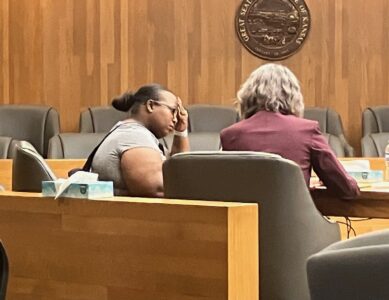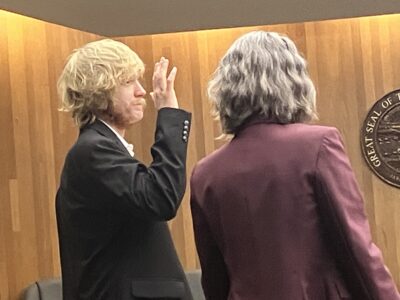Lawrence murder defendant ‘absolutely’ rejects plea offer that would have ended 3 cases
Coroner will be allowed to testify at trial, over defense objections

photo by: Douglas County Sheriff's Office
Steven A. Drake
Steven A. Drake III affirmed to a judge Thursday that he didn’t want the state’s plea offer in his pending first-degree murder case.
Instead, he’s insisting on a jury hearing the matter.
The trial for the 22-year-old Lawrence resident is set to begin Jan. 14 in Douglas County District Court, where prosecutors during a pretrial motions hearing Thursday announced the deal that they had offered.
“For the record, Mr. Drake, you’ve heard that offer, and you reject it?” Judge Kay Huff asked.
Drake, standing, answered, “absolutely.”
Drake is charged in the Sept. 19, 2017, homicide of Bryce S. Holladay, 26, of Lawrence. Drake claims he acted in self-defense when he shot Holladay in the doorway of Drake’s home in the 2000 block of West 27th Terrace.
If convicted of premeditated first-degree murder as charged, an off-grid level felony, Drake could face the “Hard 50” under Kansas sentencing guidelines — life in prison with no possibility of parole for 50 years, according to the DA’s office.
If Drake had accepted the plea offer — which combined the murder case with two other unrelated cases pending against him — the state would have recommended a sentence of 15 and a half years, prosecutor Deborah Moody said. Prosecutors asked Drake to admit to second-degree murder, a felony, in Holladay’s death, and also to plead as charged to aggravated battery, a felony, and vehicular homicide, a misdemeanor.

photo by: Contributed photo
Lawrence police officers are pictured outside 2013 W. 27th Terrace, the scene of a fatal shooting shortly before 10 p.m. Sept. 19, 2017.
Drake is scheduled to go on trial in the aggravated battery case in April. In July 2017, Drake allegedly beat a teenage boy in a fight, causing a serious head injury.
A trial date for the vehicular homicide case has not yet been set. That case stems from a November 2016 crash near Clinton Lake that killed Taylor B. Lister, 24, of Lecompton.
Coroner’s testimony will be allowed
At Thursday’s hearing, Drake’s appointed attorney, Angela Keck, also argued that former Douglas County coroner Erik Mitchell should be barred from testifying at trial. Mitchell performed the autopsy on Holladay.
The judge rejected Keck’s motion.
Huff said Mitchell — who was county coroner for more than 20 years before leaving last summer for another job — has been qualified as an expert many times. She also said that his findings were not particularly disputable in the case at hand, as Drake has argued he acted in self-defense and it’s not contested that a bullet to the face killed Holladay.
“That is intrinsically an admission that he (Drake) shot the deceased, and there’s really no confusion about that,” Huff said.
Keck had argued that Mitchell was not qualified to be an expert witness, particularly on toxicology testing of Holladay. Witnesses said he was acting bizarrely and appeared to be “tweaking” on methamphetamine, but Mitchell testified at the preliminary hearing that tests showed he wasn’t under the influence of drugs.
Keck also said that based on two earlier cases — one much earlier — Mitchell was not credible.
In a 1989 homicide case where he previously worked in New York, Mitchell changed his theory about the time of death to support prosecutors’ theory, Keck said. In 2015, a higher court ordered a new trial for Hector Rivas, who was convicted in 1993 of second-degree murder of his ex-girlfriend. At the time of the trial, Mitchell’s office was under investigation for misconduct by the same DA prosecuting the murder case.
“That shows dishonesty … and bias toward the state,” Keck said.
In the local case of Carrody M. Buchhorn, convicted this summer of murdering a baby at a Eudora day care, Mitchell gave a theory of death that outside experts have called “bizarre” and “fantastical,” Keck said.
Buchhorn is awaiting sentencing, and her defense attorneys hired those experts to support their argument that she should get a new trial. The judge in that case has yet to rule on the matter.
Prosecutors responded that the New York matter was long over and done and that Mitchell ultimately was cleared by public health authorities of any wrongdoing.
Also, prosecutor Andrew Bauch said, the Kansas Supreme Court has already taken a look at the New York situation — in a 2008 opinion regarding another case Mitchell handled in Kansas — and determined it was not relevant.
Bauch responded that the Buchhorn case amounted to “experts disagreeing with each other,” emphasizing that her matter was still being litigated.
“Dr. Mitchell is qualified,” Bauch said. “He should be allowed to testify.”







